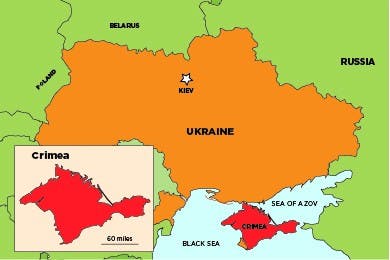Instead, the children travel downtown using sidewalks and public transportation, and amid tense political demonstrations sometimes erupting in brawls and shootings, the schools shut down.
Ukrainian student Lora Kaldaras’s brother has not attended school in three weeks because law enforcement is unable to contain and keep up with the violence spilling over from these protests.
“Recently my father was walking the dog and he saw a young guy being beaten up and he called the police,” said Kaldaras, a graduate student. “They told him they can’t respond to just one person being beaten up when on the other street they have gangs of people beating each other up.”
In the Ukraine, a division between Russian and European influences has always existed, because the state once was part of the Soviet Union and a minority of Ukrainians are ethnic Russians.
Some Ukrainians want their territory unified with Russia, while others want to remain a united Ukraine. The division deepened and turned violent, mainly in Eastern Ukraine, after former Ukrainian President Viktor Yanukovych was ousted in late February.
The ousting resulted in a dispute in Crimea, a peninsula with a population that is a majority ethnic Russian, about whether they would remain a part of Ukraine or not. On Sunday they held a referendum, with an overwhelming majority voting in favor of unifying with Russia.
Many contest the legality of the referendum and the validity of its outcome, with some Crimean cities reporting nearly unanimous votes in favor of the move, MSU history professor Matthew Pau ly said.
Prior to the referendum, military troops without insignias, largely believed to be Russian, seized military bases and stationed themselves in major cities in Crimea. On the day of the vote, Russian troop carriers were staged in front of polling locations and TV feeds to Kiev, Ukraine’s capital, were shut off.
“I am firmly of the opinion that if Ukraine were left to its own devices it would not split,” Pauly said. “The Russian military has clearly involved themselves in Ukrainian affairs and staged a referendum.”
The vote in Crimea could raise tensions among the divisions in Eastern Ukraine, where fears of Russian invasion and intervention have been furthered by major troop exercises along their shared border, he said.
“What happened in Crimea has added fuel to that fire, so people have reason to fear that the Russian military might move in and say, ‘Now a referendum is going to be held and this is going to be the result,’” Pauly said.
Tetyana Berbasova, a chemistry graduate student from Ukraine, said her home city of Kremenchuk in central Ukraine has largely been free of tense demonstrations. But she worries “the country will continue dividing further and further.”
Kaldaras has similar concerns about her home country and her family. Her parents once owned a small business, manufacturing and selling winter coats. About a year ago, officials within the government extorted her parents and the business went under.
To help her parents maintain ownership of their house and keep them provided with food and warmth, Kaldaras has started a fundraiser.
While many argue and fight about unity and secession, Kaldaras said most Ukrainians simply want normal lives where their kids are free and safe and food is always on their table - a basic need which has become a luxury due to inflation and floundering economy.






